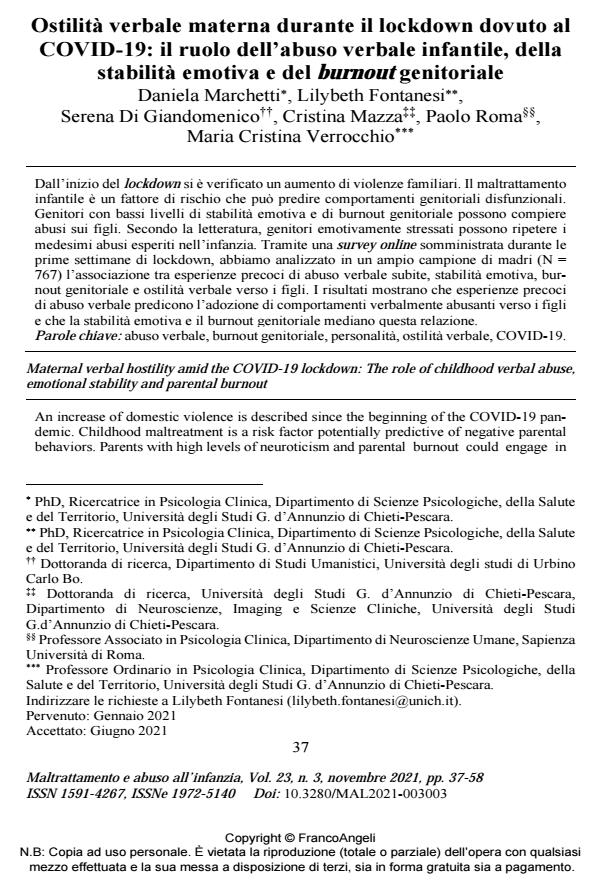Maternal verbal hostility amid the COVID-19 lockdown: The role of childhood verbal abuse, emotional stability and parental burnout
Journal title MALTRATTAMENTO E ABUSO ALL’INFANZIA
Author/s Daniela Marchetti, Lilybeth Fontanesi, Serena Di Giandomenico, Cristina Mazza, Paolo Roma, Maria Cristina Verrocchio
Publishing Year 2021 Issue 2021/3
Language Italian Pages 22 P. 37-58 File size 272 KB
DOI 10.3280/MAL2021-003003
DOI is like a bar code for intellectual property: to have more infomation
click here
Below, you can see the article first page
If you want to buy this article in PDF format, you can do it, following the instructions to buy download credits

FrancoAngeli is member of Publishers International Linking Association, Inc (PILA), a not-for-profit association which run the CrossRef service enabling links to and from online scholarly content.
An increase of domestic violence is described since the beginning of the COVID-19 pan-demic. Childhood maltreatment is a risk factor potentially predictive of negative parental behaviors. Parents with high levels of neuroticism and parental burnout could engage in child abuse. According to the literature, stressed parents could act the same abusive behaviors experienced in their childhood. An online survey was administered to a sample of 767 mothers during the first weeks of the lockdown, aiming at analyzing the association between parental early experiences of childhood verbal abuse and verbal hostility against their children during the lockdown, and the role of emotional stability and parental burnout. Findings support that childhood verbal abuse predicts maternal verbal hostility, and this relationship is mediated by neuroticism and parental burnout.
Keywords: verbal abuse, parental burnout, personality, verbal hostility, COVID-19.
Daniela Marchetti, Lilybeth Fontanesi, Serena Di Giandomenico, Cristina Mazza, Paolo Roma, Maria Cristina Verrocchio, Ostilità verbale materna durante il lockdown dovuto al COVID-19: il ruolo dell’abuso verbale infantile, della stabilità emotiva e del burnout genitoriale in "MALTRATTAMENTO E ABUSO ALL’INFANZIA" 3/2021, pp 37-58, DOI: 10.3280/MAL2021-003003